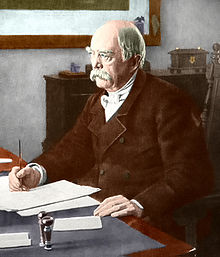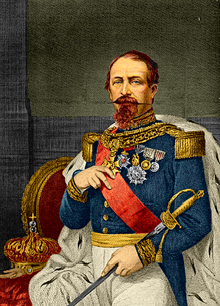Luxembourg crisis
As Luxembourg Crisis or Luxembourg crisis is referred to the disputes over the proposed purchase of the Grand Duchy of Luxembourg by the French government under Napoléon III. in 1867. It ended with the Second London Treaty of May 11, 1867, with which the great powers agreed the neutrality of Luxembourg. It intensified the tensions between France and Prussia, which culminated in the Franco-Prussian War in 1870 .
initial situation

According to Article 67 of the Vienna Congress Act of 1815, the Grand Duchy of Luxembourg was assigned to the King of the United Kingdom of the Netherlands (after 1839 the Kingdom of the Netherlands ). The title and rule over Luxembourg were intended to compensate for the loss of the Dutch rights to Nassau-Dillenburg , Siegen , Hadamar and Diez , which had fallen to Prussia . As before with these largely Hessian rulers, the Dutch king should also be able to exercise his rights en toute propriété et souveraineté in Luxembourg, i.e. regardless of his right to the Dutch throne (which he had only had since 1814). There was thus a personal union between the then united Netherlands (today's Netherlands and Belgium) and Luxembourg .
Luxembourg was a member of the (Austrian-dominated) German Confederation , and since 1842 of the (Prussian-dominated) German Customs Union . It had its own constitution and government since 1848. The city of Luxembourg was also a German federal fortress ( fortress Luxembourg ), the occupation was mostly provided by Prussia . This garrison was on the one hand unpopular with the population, on the other hand it was of considerable economic importance in the little industrialized Luxembourg of those days.
Under Napoleon III. France pursued an imperial foreign policy which aimed at territorial expansion and which intensified in the 1860s. Napoleon tried to compensate for Prussia's increase in power after its victory in the German War of the summer of 1866 by acquiring new territories . After this war, the German Confederation was dissolved and the Prussian-dominated North German Confederation was founded. With the dissolution of the German Confederation , the right to station Prussian troops in Luxembourg was now lacking. However, they initially stayed in the fortress.
The attempted acquisition
Regardless of the war in Germany, Napoleon III. tried for a long time to incorporate territories of its neighboring states. Among other things, he was interested in Belgium and Luxembourg. France and Prussia were still negotiating secretly during the Austro-Prussian war. The Prussian Prime Minister Otto von Bismarck was quite ready to negotiate because he had no way of knowing how Austria and its southern German allies would behave if a war broke out between France and Prussia.
Bismarck made it clear that ceding German territories to France would be ruled out, but recognized the solution to the conflict through French territorial expansions in principle: If France were to stay out of the process of German unification, Prussia would not object to an enlargement of France at the expense of Belgium and Luxembourg (“ within the French nation ”). France even sought a military alliance to enforce the goals of the two states against third parties such as Great Britain. Bismarck later published notes from the French Foreign Minister in this regard, after the outbreak of the Franco-German War in 1870. At the same time, Bismarck negotiated protective and defensive alliances with the southern German states to provide mutual support in the event of a French attack.
Of all the area expansions envisaged, the acquisition of Luxembourg for Napoleon III seemed. easiest to do. One consideration was that Prussia should cede East Frisia to the Netherlands and France would get Luxembourg in return. It then seemed more realistic to the Dutch King Wilhelm III. to offer five million florins for Luxembourg . William III. had previously tried to have Luxembourg admitted as a federal state to the North German Confederation in order to protect itself against the French plans to conquer. In accordance with his secret negotiations, Bismarck refused to do so. Since Wilhelm III. now found in financial difficulties, he agreed to the purchase contract on March 23, 1867.

In the meantime, the Prussian-South German alliances of 1866, which had been kept secret, became known, and Wilhelm III, who feared he would be drawn into a Franco-German conflict, made compliance with the purchase contract dependent on Bismarck's public approval. This made the attempt to buy it popular. The German public spoke out vehemently against approval: Luxembourg, as the homeland of the Luxembourg dynasty, which had established four emperors , was regarded as a German country. Bismarck could make his secret promises to Napoleon III. no longer comply, which is why he Wilhelm III. recommended undoing the purchase. The French public reacted in a similarly chauvinistic manner , and war seemed very likely. So France mobilized its troops, and Bismarck threatened a general mobilization of North Germany.
In Luxembourg itself, French agents had meanwhile become active and had provoked incidents with the Prussian troops. At that time there were different movements in Luxembourg: although they classified themselves as “German” , many Luxembourgers had great sympathy for France, and many of their poor compatriots had found work there. On the other hand, there was a strong movement that spoke out in favor of the current situation with a petition to the King-Grand Duke. At that time, the motto “ Mir wëlle bleiwen waat mir sinn ” (“We want to stay what we are”) became popular. This movement was secretly initiated by Prince Heinrich , the governor in Luxembourg very popular with the people and brother of the King-Grand Duke. International diplomacy became active and hosted an international conference on the Luxembourg crisis in London . It started on May 7th. Both sides were willing to compromise, and so the conference ended with the so-called Second London Treaty of May 11, 1867.
The resolutions of the Second London Treaty
- France does not acquire Luxembourg, the sovereign remains the Dutch king.
- For this, Prussia withdraws its garrison from the fortress and this is destroyed as far as the King-Grand Duke deems necessary.
- Luxembourg should remain neutral in future conflicts.
- The guarantee powers of the first London treaty, France , Great Britain , Prussia , Austria and Russia are to watch over the observance of this treaty also this time.
Significance and consequences of the Luxembourg crisis
The tensions between Prussia and France were not evened out, but worsened because Napoleon III. felt betrayed by Bismarck. The Luxembourg crisis was already viewed by contemporaries as a step towards the Franco-German war, in appreciation of the later actual course, and often as a "missed opportunity" by the military.
For Luxembourg itself, the importance of this conflict cannot be overestimated. The razing of the fortress, pursued by the Luxembourgers far more than required by the Treaty of London, enabled the city to grow and promoted industrialization considerably. The most important thing was the international stabilization of Luxembourg as an independent state. The Luxembourg crisis marks the beginning of this emancipation process for the Luxembourgers. A side event of the congress must be viewed as of particular importance for the overall economic development of Luxembourg and the country's steel industry, which is currently being built up: The Luxembourg Prime Minister Baron Victor de Tornaco managed to keep the country in the German Customs Union despite being neutral .
literature
- Christian Calmes, Danielle Bossaert: Histoire du Grand-Duché de Luxembourg. De 1815 à nos jours (= Histoire contemporaine du Grand-Duché de Luxembourg. 13). Editions Saint-Paul, Luxembourg 1994, ISBN 2-87963-209-9 .
- Pierre Ruppert: Le Grand-Duché de Luxembourg in ses relations internationales. Recueil des traités, conventions et arrangements internationaux et dispositions législatives diverse concern. Bück, Luxemburg 1892, pp. 151–152.
